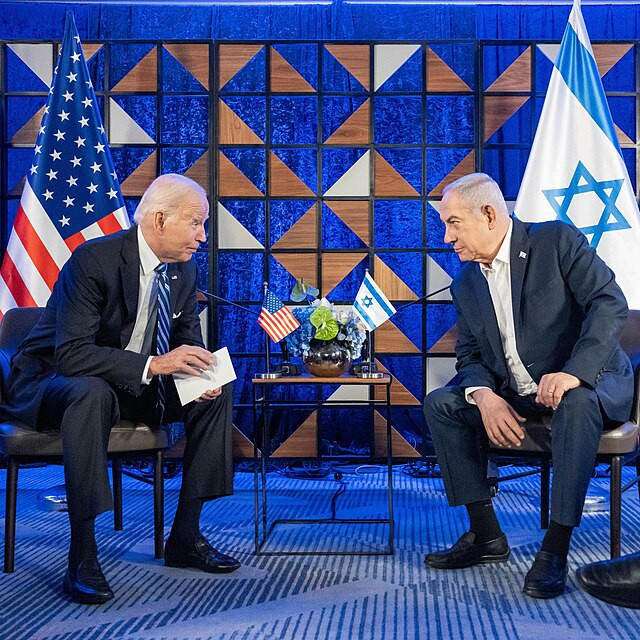President Joe Biden and Israeli Prime Minister Benjamin Netanyahu spoke on Wednesday for the first time in months, discussing Israel's response to Iran's recent missile attack and the broader implications of escalating conflicts in the Middle East. Israeli Defense Minister Yoav Gallant warned that any Israeli strike on Iran would be "lethal, precise and surprising," indicating a decisive shift in Israel's strategy toward its adversary.
The call between Biden and Netanyahu came as tensions peaked following a series of Iranian missile strikes that were largely intercepted by Israeli defenses, with assistance from the U.S. military. Though the attack caused no significant casualties, it underscored the deepening hostilities between Israel and Iran. Gallant, in a statement released by his office, said, "Whoever attacks us will be hurt and will pay a price. Our attack will be deadly, precise, and above all surprising; they will not understand what happened and how it happened."
The conversation marked a critical juncture in U.S.-Israel relations, with both leaders under pressure to address the widening regional conflict. According to sources familiar with the matter, Biden has voiced frustration over Netanyahu's approach, with journalist Bob Woodward's upcoming book quoting Biden as saying, "Bibi, what the f***?" in a moment of exasperation following Israeli strikes in Beirut and Iran earlier this year. The strained dynamic between the two leaders reflects broader disagreements over Israel's handling of its military operations in Gaza and against Hezbollah in Lebanon.
As the conflict drags on, Biden faces mounting criticism from both international allies and within his own Democratic Party for not leveraging the U.S.'s influence over Netanyahu more effectively. Vice President Kamala Harris, who joined the call with Biden and Netanyahu, has also been drawn into the political fallout, particularly as she campaigns ahead of the upcoming election. Harris has been pressed to defend the administration's policy on the Middle East amid concerns that losing Arab American support could jeopardize key battleground states.
The White House has yet to issue a detailed statement on the call's outcome, but the Biden administration's efforts to temper Israel's retaliation appear to have met with limited success. Netanyahu has vowed that Iran will face consequences for its actions, while Tehran has warned that any retaliation would trigger widespread destruction. This escalating rhetoric raises fears of a broader war in the oil-rich region, which could potentially draw the United States deeper into the conflict.
Gallant's decision to cancel his scheduled meeting with U.S. Defense Secretary Lloyd Austin, at Netanyahu's request, further highlights the growing divide between Washington and Tel Aviv. The cancellation has stirred controversy within Israel, with former defense minister Benny Gantz publicly criticizing the move, claiming it harmed Israel's national security "for personal and political considerations."
In response to Iran's missile attack, Israel is also weighing a broader military strategy that could involve targeting critical Iranian assets. While Biden has indicated that he does not support a strike on Iran's nuclear sites, he has left the door open to other forms of retaliation, particularly against Iran-backed groups like Hezbollah and Hamas. However, Biden has urged Israel to consider alternatives that do not escalate the situation further, hinting at diplomatic solutions rather than military ones.
Amid this tense backdrop, Israel's actions in Lebanon have drawn international scrutiny. Israel's targeted assassination of Hezbollah leader Hassan Nasrallah and the detonation of communications devices used by Hezbollah operatives have significantly escalated the situation. U.S. officials have reportedly been blindsided by some of these Israeli actions, fueling concerns about the lack of coordinated strategy between the allies.
As Israel prepares for possible retaliatory measures, Washington is closely monitoring how the conflict unfolds, especially with concerns that any Israeli action could destabilize global oil markets. Biden's stance on avoiding a strike on Iranian oil fields suggests a cautious approach, aimed at mitigating further disruption in a region already on edge.
The unfolding scenario is also taking on an electoral dimension in the U.S., with Biden and Harris's handling of the conflict becoming a contentious issue in the upcoming presidential race. Criticism from within the Democratic Party and the potential loss of support from key voter blocs, such as Arab Americans, could have significant political repercussions. Independent candidate Jill Stein's support among Arab American voters in Michigan poses a challenge for Harris, who may need that state to secure a victory against former President Donald Trump in what polls indicate is a tight race.
Netanyahu, on the other hand, remains steadfast in his strategy, dismissing calls for a ceasefire in Gaza and Lebanon while emphasizing Israel's right to self-defense. He has faced widespread condemnation over the significant civilian casualties in Gaza, where over 42,000 Palestinians have been reported killed according to Hamas-run health authorities, as well as in Lebanon. Israel maintains that its military actions are in response to the October 7, 2023, attack by Hamas, which left over 1,200 Israelis dead and resulted in the abduction of 250 hostages.




